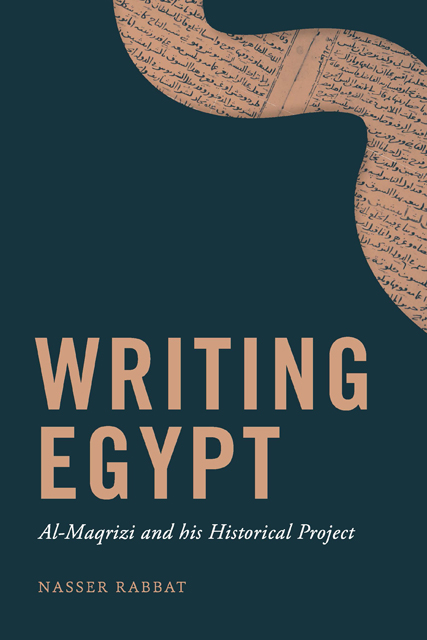Book contents
- Frontmatter
- Contents
- Preface
- List of Short References to Frequently Cited Primary Sources
- List of Abbreviations
- Notes on Transcription and Dates
- Introduction: A Singular Mamluk Historian
- Part 1 The Life of al-Maqrizi
- Part 2 The Writings of al-Maqrizi
- Part 3 The Afterlife of al-Maqrizi’s Writing
- In the Guise of a Conclusion: Becoming the Greatest Historian of Egypt
- Bibliography
- Index of Books Cited in the Text
- General Index
1 - The Formative Years
Published online by Cambridge University Press: 02 June 2023
- Frontmatter
- Contents
- Preface
- List of Short References to Frequently Cited Primary Sources
- List of Abbreviations
- Notes on Transcription and Dates
- Introduction: A Singular Mamluk Historian
- Part 1 The Life of al-Maqrizi
- Part 2 The Writings of al-Maqrizi
- Part 3 The Afterlife of al-Maqrizi’s Writing
- In the Guise of a Conclusion: Becoming the Greatest Historian of Egypt
- Bibliography
- Index of Books Cited in the Text
- General Index
Summary
Today, it is all too common to view any author’s oeuvre in the light of their circumstances and psychological, emotional, and intellectual conditions and proclivities. Background, upbringing, successes and failures, and all the other experiences are seen as fundamental building blocks in shaping, understanding, and explaining an author’s oeuvre. So established has this mode of inquiry become that it has spread from its original application to creative pursuits to permeate the study of all literary and scholarly forms, even those social sciences that have traditionally claimed to be governed by rules of objectivity, empiricism, and scholarly detachment immune to the tendencies of personality and circumstances. This development is a direct outcome of two of modern culture’s foremost post-Freudian psychosociological foundations. One is the belief in the primacy of individual motivations and inhibitions in determining the scope and orientation of one’s life and work.The second is the mania for memorializing, which translates into a society-wide effort to preserve every shred of memory of those outstanding individuals deemed worthy of remembrance and celebration by the nation, if not by everyone.
Medieval cultures were less emphatic on both counts. Record keeping was far more restricted in range and magnitude and far more arduous and time-consuming than it is today. Medieval scholars had different and less pronounced attitudes toward individuality, authorship, immortality, and remembrance, all concerns that underwent a phenomenal shift in significance in modern times.This observation has been made about both the Western and Islamic worlds. Medieval Islamic scholars, like their Western peers, maintained a relatively inconspicuous presence in their writing, though in varying degrees depending on the genre. They followed established scholarly and literary etiquettes that tended to conceal personal touches behind ready-made narrative structures and elaborate prose techniques. Their personas, however, came with distinct sensibilities, codes, and textual strategies specific to their religious and sociocultural values.On the whole, they shared with the rest of their society a fatalistic outlook on life, an inherent disinterest in causality, individual will, and responsibility in explaining events and occurrences. Most of their reporting stopped short of searching for reasons or explanations, and usually ended instead with a variation on an equivocal expression, such as “wa li-Allah al-amr min qabl wa min ba‘d (It is God’s will before and after),” or “wa Allah a‘lam (God only knows).
- Type
- Chapter
- Information
- Writing EgyptAl-Maqrizi and his Historical Project, pp. 11 - 59Publisher: Edinburgh University PressPrint publication year: 2023

